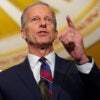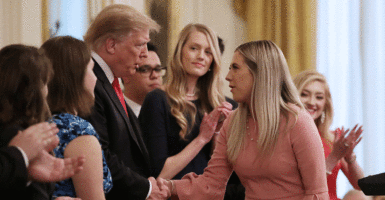Why did some millennials vote for Barack Obama in 2012 and Donald Trump in 2016? Jonathan Jakubowski, author of “Bellwether Blues: A Conservative Awakening of the Millennial Soul,” joins The Daily Signal Podcast to discuss.
“There’s a lot of reasons that motivated these millennials to change their votes over the course of time,” says Jakubowski. “It didn’t happen in one single event. It didn’t happen because of one podcast or one show or one friend. It was conversations. It was things that they read. It was life events that ultimately culminated in a deep change.”
Read the lightly edited transcript, posted below, or listen to the podcast:
We also cover these stories:
- A new study has revealed that the drug remdesivir might be very effective against COVID-19.
- Secretary of State Mike Pompeo continues calls for the United States to be able to access labs in Wuhan, China, as the country continues to investigate the origins of the coronavirus.
- Sen. Ted Cruz introduces legislation aimed at “cutting off Hollywood studios from assistance they receive from the Department of Defense if those studios censor their films for screening in China.”
The Daily Signal podcast is available on Ricochet, Apple Podcasts, Pippa, Google Play, or Stitcher. All of our podcasts can be found at DailySignal.com/podcasts. If you like what you hear, please leave a review. You can also leave us a message at 202-608-6205 or write us at [email protected]. Enjoy the show!
Rachel del Guidice: We’re joined today on The Daily Signal Podcast by Jonathan Jakubowski. He’s the author of the soon to be released book on May 5th called “Bellwether Blues: A Conservative Awakening of the Millennial Soul.”
Jonathan, it’s such an honor to have you on The Daily Signal Podcast. Thanks for joining us.
Jonathan Jakubowski: Thank you, Rachel. The honor is mine.
Del Guidice: Well, it’s a pleasure to have you with us. So your book coming out on May 5th, “Bellwether Blues,” talks about how millennials have switched over from a more liberal outlook in voting to conservative.
Before we get into the book itself, can you break down for us the millennial generation today and what you saw? And where they were leaning toward when it comes to politics and policy?
Jakubowski: Sure, yeah. The millennial generation is incredibly important to our electoral demographic because it’s the largest electoral demographic.
Now, traditionally, the hit against millennials has been that they don’t come out and vote. They might register to vote, but they don’t vote.
Well, that changed in the midterms of 2018. They came out in droves and affected the turnout in the votes in a number of states.
So that’s a very important demographic to pay attention to. And it’s only going to be growing in importance in the future.
Del Guidice: Can you tell us a little bit about the book, “Bellwether Blues,” and also the inspiration for the title? It’s such an interesting title and I want to hear about the title itself—why you decided on that title—and then just a little bit about the book, unpacking what all is in it.
Jakubowski: Yeah, absolutely. I think one of the fun parts of the book was diving deep into this generation. I think there’s a lot of ideas out there as to who a millennial is. And a lot of stereotypes that certainly a lot of millennials fit. But the thing that I’ve found is there’s also a lot of millennials that don’t fit those stereotypes.
As I do research with a variety of sources, what I found is there’s really a split in the millennial generation. And, ironically, the generation that most dislikes the millennials who fit the stereotypes are the millennials who don’t fit the stereotypes.
So what I’ve found over the course of time—and it’s a Winston Churchill quote that people might be familiar with—is that if you’re not liberal at the age of 25, you have no heart. If you’re not conservative at the age of 35, you have no brain. That quote, which I think brings a lot of humor to the table. … The question is, is that true? Is that true of American millennials?
And what I saw and what inspired the title is there’s a lot of millennials that are indeed leaving the left. There’s movements out there like #walkaway. We use the hashtag #lefttheleft, which we’ve seen before.
There’s a lot of millennials that have become deeply disillusioned with the nature of political affairs. And as the left has gone further to the left, it’s alienated a base of voters who would otherwise be predisposed to their ideology—millennials who passionately care about things like classical liberalism or First Amendment freedoms.
The more they’ve abandoned that base, the more that base has gotten the blues. Which led to the title “Bellwether Blues.”
There was a statistic that I have early on in the book that talks about how 71% of millennials would prefer for there to be a third party. So they’re tired of Democrats in that platform and how far to the left they’ve gone, but they can’t necessarily yet stomach the idea of voting for Republicans.
So they’re kind of stuck in the middle and they have this symptomatic case of the blues and they’re down and out.
That really is what builds my case at the end of the book for arguing to conservatives [that] we have to use a different level of persuasion to win the soul. And if we can win their souls, I think we can also win their votes.
Del Guidice: The book, as you mentioned, is a compilation of seven stories of millennials in “swing country America” that swung from [President Barack] Obama to [President Donald] Trump. …
I obviously don’t have time to go into super big detail, but can you talk about and introduce each of these seven people and give us a little bit of a teaser as to what their story was?
Jakubowski: Yeah, absolutely. Thanks for that question.
I wanted to use empirical evidence to demonstrate that there is a move away from the left. But then I wanted to use anecdotal evidence to demonstrate what’s happening in swing country America.
I happen to live in one such swing county of 3,142 counties in America. There are 59 that are classified as swing, as having voted for Bush, Bush, Obama, Obama, Trump. And then in the state of Ohio, my state, there’s only four that fit that designation.
My county is the youngest of those counties. So going deep into that county and then looking at the stories of millennials in those counties, I thought would have important lessons to offer us as we consider this generation.
Through the anecdotal evidence with the stories that I have—and [they are] very, very powerful and persuasive stories—there’s a lot of reasons that motivated these millennials to change their votes over the course of time.
It didn’t happen in one single event. It didn’t happen because of one podcast or one show or one friend. It was conversations. It was things that they read. It was life events that ultimately culminated in a deep change in persuasion.
By the way, Rachel, it wasn’t just about the persuasion of an individual candidate. President Trump is not necessarily the favorite candidate of all of these millennials.
Some of them really love him, but some of them just went for him because they really believed in issues that he stood for—like pro-life, like the Second Amendment.
I saw a factor of Blexit, where there’s African Americans who are leaving the left because they saw lack of progress in the cities with their friends and family. Certainly the blue-collar vote. So … all seven stories have a lot to offer us, I believe.
Del Guidice: … I know this is probably going to be hard to say because all of them are compelling in different ways, but was there one story in particular that really stood out to you or was really especially powerful for a particular reason?
Jakubowski: Yeah, I think there’s one that stands out in Wood County especially. We have a blue perimeter—I don’t know if you’re familiar with the blue wall concept, where we had Pennsylvania, Michigan, Wisconsin, the northern parts of Ohio that had never gone for a Republican candidate. And then Trump scaled the blue wall.
Well, in Wood County, what makes it so perfect and bellwether is we have multiple demographics mixing together. But around the perimeter of our county, there’s this really strong blue-collar vote. That’s represented, at least in 2016, maybe an eighth of the entire voting population.
There’s one story of a millennial who is blue collar, grew up in a union family, voted for the Democratic Party their entire life.
And then in this election, through the course of events—really seeing things like Benghazi, seeing the alienation of patriotism, seeing a hatred toward “court’s country” and deep values, the Second Amendment—that really led him to embrace not only President Trump, but also the values that the Republican Party stands for.
Del Guidice: I know when we were talking about the book a couple months ago, you had mentioned to me that there was a particular person, I’m not sure who it was, but one of the seven people was a little bit nervous about speaking out, but then eventually ended up saying, “The story is really important and I’m definitely going to share.”
Are you able to talk about that at all and maybe, just more even generally, if people were a little bit hesitant to speak up? And what made them change their minds and want to go on the record about this?
Jakubowski: Yeah, that’s a great question. And we have to consider the fact that … I’m a millennial as well. So there’s a lot of peer pressure in the other direction. And depending upon where you grow up, especially if you’re in the coast.
I think there’s a ton of pressure that if you’re going to express a different opinion than the status quo, you’re going to face a lot of peer pressure. Well, that peer pressure might be lessened in “swing America.” But it’s still there.
So the considerations of having a political book, sharing their stories, took a lot of courage. And I really admire the seven individuals that came forward and said “yes.”
Because, Rachel, I found a lot of other stories that fit the same kind of story, demographic, title, switch and change. But they weren’t willing to come on the record.
In fact, the blue-collar story I just referenced with Jeremy Harpal, I talked to over a dozen people who had the same exact story but didn’t want to go public because they were concerned about whether or not people in their job might look at them a different way.
In some cases, they were angry at pollsters and wanted to continue having pollsters thinking that they’re going to be voting for a Democratic candidate. When in reality they’re going for President Trump.
So there’s a variety of reasons that I saw that led people to say “no.” But, thankfully, we had these individuals who said “yes.”
Del Guidice: Is it your hope? And do you think that because these seven people were able to speak out and share their stories that this will help [give] other millennials who maybe are nervous about how their paradigm is shifting the courage to speak out and talk about these things as well?
Jakubowski: I hope so. And I do believe so. I think as we phase and get older in life, we start thinking more about other people, namely children.
As we have a family and growing relationships, when our thoughts start moving to other people in our families, we’re less concerned about what people think about us and more concerned about the livelihoods, the future of our children.
I think that the conservative platform—faith, family, and freedom—which I talk a lot about in the book, those ideals that resonate lead people to become more emboldened, to stand up for what they believe to be the best possible future hope for their children, and for their children’s children.
Del Guidice: Mentioning faith, family, and freedom, obviously, very important issues to so many people across the country, but looking at specific issues that [brought] these seven people … over from a more liberal background and conviction to conservative point of view, was there any one or two issues that you saw as common threads that kept resurfacing as to why people are leaving the left?
Jakubowski: Yeah, I think I can sum it up in the word “freedom.”
A freedom is something that we as Americans have in our DNA. It’s a part of who we are. It’s in our anthems, it’s in our pledges. It’s basically in anything and everything we talk about is freedom.
We value freedom to the core. But we don’t really understand the depths of freedom until we lose it.
… We’ve seen the Democratic Party move all the way over to the left, abandoning the tenants of classical liberalism.
I mean, we had a president as recently as 1996 sign bills like things similar to [what] would be on a Republican Party platform, but also Religious Freedom Restoration Acts that would speak toward the expression of freedom.
I think the millennial generation and younger generations really value that freedom. And while they’re being sold a false bill of goods on things like socialism and the benefits of it, they still also, at the same time, value freedom. And the more they come to understand socialism and its negative effects on society.
The more they embrace freedom and the better we can communicate it, the more they’ll go in our direction.
Del Guidice: In writing “Bellwether Blues,” what would you say was the biggest challenge or the hardest part about writing the book?
Jakubowski: Honestly, it was the acknowledgement. I sat there at the very end of the book and, Rachel, I learned a lot about writing a book.
I’m a first-time author. But it was so fun writing the book. Everything seemed to come together so naturally.
[At] the very end, I realized they say that a dream is a goal with a plan. What I learned is it’s not just a goal with a plan, it’s also a goal with a plan with patrons—people who are willing to support you, who are willing to invest into your life.
I had so many people, encouraging voices, people that were willing to be involved in the book. People that were willing to give me advice, people like yourself [who] are willing to bring me on a podcast, as a first-time author. That’s incredible. I look at that and just have an incredible depth of gratitude.
And I was thinking about, who am I going to not include on this list? It feels very long and I feel like it should be longer. Honestly, that was the hardest part of the book for me to write.
Del Guidice: What was the thing that surprised you the most, either in your research or the interviews of the people you did? Or just maybe left the biggest impact on you in this whole process?
Jakubowski: I think that I understood the power of story. But when I’m sitting there writing these stories and then getting deeper into people’s lives, what surprised me is that, over the course of time, somebody doesn’t change their mind, usually, instantly. It happens over the course of time.
And there were a lot of people who spoke truth … without any expectation that there would be some shift or ramification to something they did or something they said.
Then the fidelity of relationship that endured over time as they walk those long miles of relationship. That led these individuals to change their votes.
I guess I never thought about it that deeply. I thought about it more being like the talk-show hosts, the media, the press, what you read. But there was a lot of power in relational equity. And relational equity with truth equals transformation.
Del Guidice: Speaking of that, I know earlier on in our discussion you talked about winning hearts and minds and the power of these interpersonal relationships.
Speaking to maybe other millennials or even Gen Zers out there, who maybe do come from a conservative background, or maybe they have left the left themselves and they’re trying to have these discussions with friends or family members, how would you encourage them to talk to peers in this kind of mindset of maybe they come from that background or maybe they’ve always been conservative? How do you encourage them to connect on that heart level?
Jakubowski: That’s a really good question. I would say, first, you want to think smaller and deeper.
We have the tendency to believe that a post that we send on social media might be the best way to influence a thousand people because it’s kind of quick access. And our society has led us to have all of these incredible benefits. So immediately, we can have instant gratification in terms of responsiveness.
But what we’ve forgotten is there is a deeper art that reaches deeper into the soul and that is individual relationship. So if you can spend time with somebody, even if they reject your worldview, but you cultivate relationship with them, over time, [you influence] them.
Even if they reject your ideas, they’re going to see your lifestyle, they’re going to see your character, they’re going to see what you stand for and believe in. And that’s going to deeply persuade those individuals that you’re in relationship with.
Del Guidice: Thanks for sharing that. Lastly, where can people get “Bellwether Blues”? We’re in the midst of COVID right now, so bookstores and the like aren’t on their usual mode of operations. So if people want to get it, how do they get it?
Jakubowski: Yeah, thank you. Our website is currently selling pre-orders on bellwetherbluesbook.com. But the official launch date, as noted earlier, is May the 5th. So it should be available on Amazon. I think Barnes & Noble and Books-A-Million will also have links, so they’ll be able to ship books out.
I don’t know exactly when they’re going to reopen so that we can get books out on shelves, but, certainly, online through those channels you can get a book.
Del Guidice: Awesome. Jonathan, thank you so much for joining us on The Daily Signal Podcast. It’s been great to have you.
Jakubowski: Rachel, I’m a big fan, so it’s really, really an honor to be here. Thanks so much for having me.
Del Guidice: Well, thank you.
































